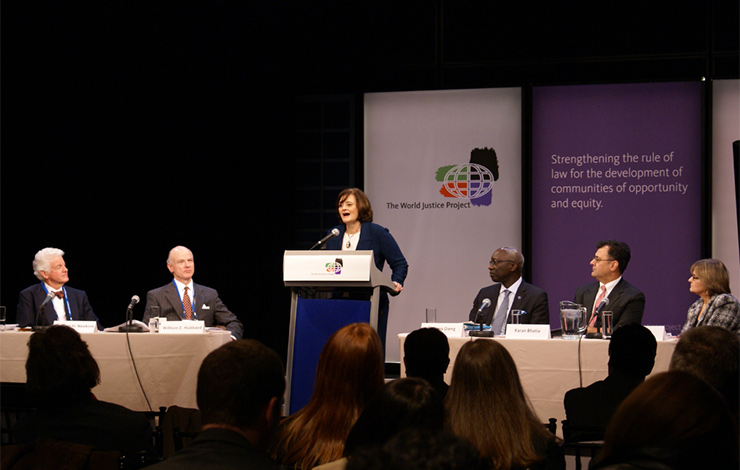
This year’s Davos rightly created some noise around the idea that businesses have an important role to play in protecting fundamental rights. A particular highlight was the publication of the B Team Leader’s statement (“B Team Leaders call for business to stand up for human rights”) supported by Richard Branson, Arianna Huffington, Mo Ibrahim and Professor Muhammed Yunus among others. It called for business leaders to use their influence to uphold human rights, including decent working conditions, fair wages and ethical purchasing decisions. This is not the first time that business and human rights has been on the Davos agenda; in 1999, Kofi Annan’s ground-breaking Global Compact initiative was announced there.

Since 1999, evidence that embracing human rights is good for business has grown dramatically. According to a recent study undertaken by the Harvard Business School, companies that have adopted a comprehensive set of corporate policies related to the environment, employees, community, products, and customers, “significantly outperform their counterparts over the long-term, both in terms of stock market as well as accounting performance”. In an increasingly connected world, companies need to preserve one of their greatest assets, brand equity. Studies have shown that customer boycotts of products tainted by human rights abuses cost demonised companies around GBP 2.6 billion a year. This is one of the reasons why far sighted businesses are paying attention to human rights and reaping the benefits in terms of competitive advantage, increased productivity, whilst reducing cost and attracting smart investors. All of this has an additional benefit in attracting the best recruits. Studies have shown that companies with human rights compliant work practices receive up to 45 percent more unsolicited employment applications than companies that do not.
Nevertheless when I discuss these issues with CEOs and business leaders, the same question arises: what are the practical steps that can be taken to promote human rights without crippling operations? Taking a human rights approach to business is not just another rebranding of corporate social responsibility initiatives or philanthropy. Philanthropic giving is, of course, to be encouraged by any socially responsible company, but building a medical clinic, or supporting a local NGO, cannot offset complicity in child labour practices, or discriminatory treatment of workers. Integrating human rights goes to the core of a business; it requires implementation of policy commitments, efficient management structures, and ongoing due diligence procedures.
The Human Rights Council’s 2011 endorsement of the UN Guiding Principles on Business and Human Rights (better known as the “Guiding Principles”) provided some much needed clarity on this issue. The Principles deliver some practical advice, encouraging businesses to publish human rights policies for instance. But policies alone are meaningless if they are not integrated into the day to day practices of a business. Good intentions at head office level are not enough if they do not permeate the furthest reaches of the company. Much has been learnt about stakeholder engagement since Royal Dutch Shell’s conflict in the Niger Delta with the Ogoni people. The impact of that dispute was a 16 year legal battle to reach a settlement of US$15.5 million. However, the extractives industry by its nature faces the risk of conflict with local communities impacted by its operations. An interesting SRMining paper published in 2011 has estimated that company-community conflicts can cost the average world-class mining project[i] a staggering US$20 million per week in lost productivity through delays. This makes a compelling case for investing into engaging with affected communities, with accessible grievance mechanisms and fair and swift remediation if abuses are identified.
Managing supply chain risk also involves significant challenges and investment, particularly for the commercial consumer goods industry. Nevertheless it is essential companies take this risk to heart. The garment industry learnt its lesson after the terrible collapse of the Rana Plaza factory building in April 2013, which killed more than 1,100 people and injured a further 2,500. I am pleased to see that the recently announced Accord on Fire and Building Safety in Bangladesh is gaining good traction with over 130 signatories. This is a legally-binding agreement that requires independent safety inspections with public reports on all Bangladeshi suppliers used by the signatory companies, and mandatory repairs, renovations and safety upgrades. The tragedy is that this step only came about after such dreadful loss of life. More consistent, effective, human rights due diligence such as this performed by the brands we know and love could prevent a great amount of human suffering.
I recognise that improving, resolving and overcoming human rights injustice requires both financial and leadership commitment from big and small business alike and the balance is not always easy. Nevertheless we must keep pushing for transparency and accountability, for better standards and the living wage. As transparency and technology inform the choices we make and the products we buy, companies that can demonstrate their commitment to improving the living standards and environment in the countries they work will be rewarded in their bottom line, and that is the business case for human rights that caused so much interest in Davos last month.
[i] Classified as mining projects with a capital expenditure of between US$3–5 billion.







